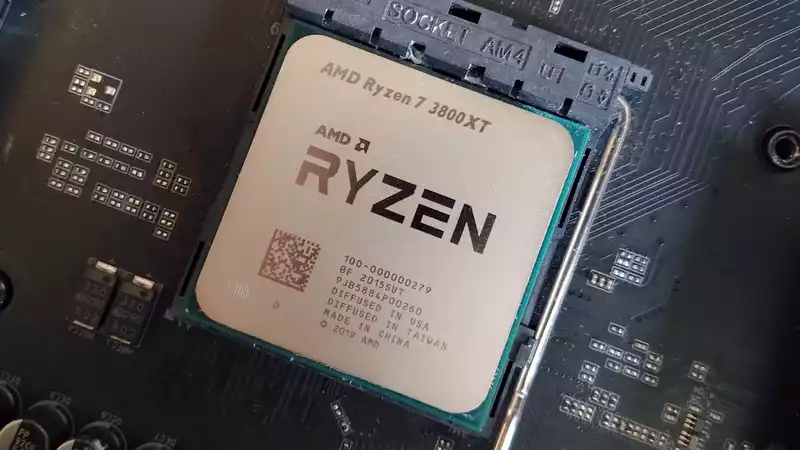The AMD Ryzen 7 3800XT is a somewhat surprising star in the XT release lineup: while the Ryzen 9 3900XT and Ryzen 5 3600XT have a 100MHz increase in maximum boost clock, the 3800XT has a 200MHz increase instead. Notable.
The base clock is unchanged, and while it won't approach this new 4.7GHz ceiling when using all 16 threads simultaneously, we should see an improvement in situations where a single core is under pressure to deliver its performance. And indeed it did: in Cinebench R20, the 3800XT recorded a single-core figure of 539, the highest I've seen. This is higher than the Intel Core i9 10900K.
Before we dive into the performance hole, let's see what the Ryzen 7 3800XT is and where it stands in the marketplace: like the 3800X, the new 3800XT is a higher-clocked version of the 3700X, but otherwise identical. That is, 8 cores and 16 threads, 32 MB of L3 cache, PCIe 4.0 support, and unlocking (though this last point is a bit moot, as Zen 2 chips are not very overclockable).
The issue here is price: the Ryzen 7 3800XT will launch at $399, which is a perfectly reasonable price for what you get. However, the Ryzen 7 3800X has dropped significantly in price in the year since it launched for the same $399, and can now be had for as low as $320. That's $80 less than it would have cost had the boost clock been slightly slower. The Ryzen 7 3700X, on the other hand, is usually available for $290 and has a base clock of 3.6 GHz and a boost clock of 4.4 GHz (both clocks are 300 MHz slower than the 3800XT, but otherwise identical).
Further influencing the value proposition, something we have not yet touched on: the 3800XT does not come with a cooler, while the 3800X and 3700X do. by AMD's logic, many users do not use the coolers that come with their CPUs, preferring to use aftermarket coolers The question is why? Why bundle a cooler with the CPU that no one uses? This is a valid point, and would have been made if AMD had reduced the price of this chip by the price of the cooler in the first place.
As it stands, it seems like you get less for the same amount of money. This would not be such a blow if it were not for the fact that the Wraith included with the 3800X and 3700X is a thoroughly capable cooler to begin with. It's certainly not for overclockers, but it has no problem keeping CPUs happy at stock speeds (most do anyway.) The 3800XT essentially has a bit of an uphill battle to justify it, but if it can deliver on the performance front, it has a chance.
It looks pretty good from a pure system performance standpoint, and strong numbers in Cinebench R20 indicate that this product is the right choice for those who want to get their hands on 3D rendering. the X265 video encoding benchmark is just over a frame per second faster than the 3700X. Only a little over one frame faster, but it shows that it is well suited for video needs.
The problem here is that if these activities are important to you or need to be done at work, there are better options, such as the 3900X or, if your wallet can afford it, the 3950X. If you just want to get into that sort of thing, the 3700X is a much better value right now; the 3800XT is not bad, but it is clearly not the best value or performance option, as was the 3800X that came before it.
AMD has made great strides in improving gaming performance with Zen 2, with a slightly higher boost clock that allows for higher frame rates. However, it really depends on the game in question and how it uses the cores at will. Currently, AMD is not completely winning in all games used in the tests, but the lead Intel has typically enjoyed is getting smaller and smaller.
Metro Exodus is a case in point, with the Ryzen 7 3800XT closing in on the 9700K by just one frame per second. Certainly, the Core i9 10900K holds a healthy lead here, but that still means that the Ryzen 7 3800XT will not be a drag on gaming rigs.
This is especially true if you're looking to gameplay at 4K; even compared to the 10900K, there's only a 5 fps difference between the two. This is a pretty good place for AMD to be.
Overall, the Ryzen 7 3800XT is a decent processor capable of producing good results. The only drawback is the cost; unfortunately for AMD, the price at launch doesn't make much sense. The lack of a cooler makes it less attractive than the 3800X and 3700XT from the start, and given that these chips enjoy a year's worth of price reductions, that is ultimately the better option.
The Ryzen 7 3700X has been on our best CPU buying guide for the past year, but the 3800XT has done little to change that. Rather, it highlights how the 3800XT is a bargain: if you want an 8-core, 16-thread CPU, you should be looking at older processors, not this XT chip.
As mentioned in our Ryzen 9 3900XT review, if you want to invest this much money in a processor, we recommend holding off if you can until the end of the year, when the Zen 3 is released. If you can't wait, the older Zen 2 chip is simply a better option.
.

Comments